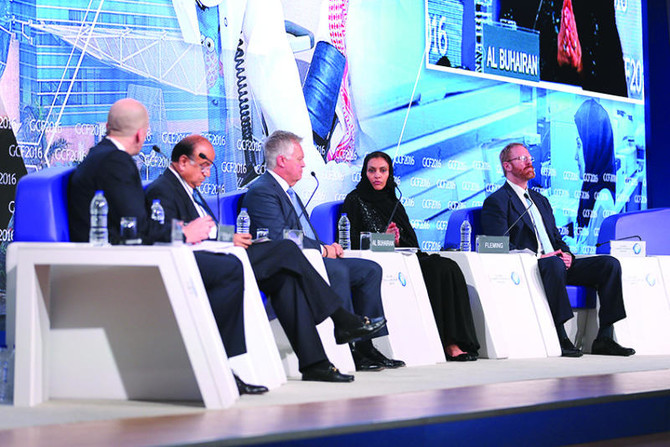RIYADH: Local and international businessmen have been urged to invest in the Kingdom’s health care projects, which have an allocation of SR41 billion for the next five years.
This was stressed during a panel discussion on "Health care: What technologies will transform health care for developing countries"
Dr. Basma Saleh Al-Buhairan, managing director of health care and life sciences sector at the Saudi Arabian General Investment Authority (SAGIA), said the Kingdom's interest to look after the health of its citizens has made the authorities to chalk out a national health plan.
The others who participated in the discussion included Suresh Kumar, executive vice president for external affairs at Sanofi; Steven J. Thomson, senior vice president and chief business development officer at Brigham and Women's Health care; and Jonathan A. Fleming, president and treasurer of NEHI Health Policy Research Organization.
Al-Buhairan said the country has a local population of 6.9 million people. It has over 800,000 people over the age of 55 years and diabetes is a disease, which has affected a section of the people, she said, adding that these are challenges that have to be overcome with proper health planning.
“The high rate of diabetes, obesity and heart diseases coupled with the increasing population growth will turn these challenges into attractive opportunities for investment in the health care sector,” she said. “The reduction of government spending for the coming years will open more opportunities for the private sector to invest in health care.”
Kumar explained that by 2020 the number of diabetics in the world will go up. Around 1.6 million die around the globe due to diabetes and the Kingdom is also concerned with the rising number of diabetics, which has prompted new areas of health care projects in Saudi Arabia.
Thompson said modern technology can be harnessed during this generation when people are making the best use of smart phones.
The forum, which was inaugurated by Abdullatif Al-Othman, governor and chairman of the board of (SAGIA, was attended by more than 2,500 delegates from the Kingdom and other parts of the world.
The forum, which brought together global business leaders, international political leaders, intellectuals and journalists, featured over 80 international speakers to network and discuss the positive impact of organizational and national competitiveness that can have on local, regional, global economic and social development.
Speakers included Vicente Fox, former president of Mexico (2000-2006), Al-Othman, Health Minister Khalid A. Al-Falih, Commerce and Industry Minister Tawfiq Al-Rabiah, Education Minister Ahmed Al-Issa and Housing Minister Majed Al-Hugail.
The forum shed light on the ingredients that are essential in driving the competitiveness of sectors, the strategies that governments should follow to accelerate competitiveness and, most importantly, the role of competitive sectors in maintaining a sustainable economic growth.
The priority sectors that have been identified to have a direct impact on economic and human development include health care and life sciences, transport, education, ICT, and the services sector such as tourism, financial services, real estate, professional consulting.
Global and local perspectives on issues such as the importance of innovation and ensuring high levels of productivity toward achieving competitiveness in sectors will take a significant part in panel discussions. In addition, discussion highlighted the achievements of economic diversification and the creation of jobs for a growing youthful population.
“We at SAGIA, alongside our partners in the public sector, are committed to leveraging the Kingdom’s unique position as the largest economy in the Middle East toward sustainable economic growth. We will be working together to ensure Saudi Arabia’s business climate fosters and attracts quality investments that attribute to diversified economy, knowledge transfer and job creation, utilizing our talented human capital across all sectors,” a SAGIA official said.
Competitiveness is linked to improving the standard of living of citizens and achieving prosperity and stability, while providing job opportunities is linked to achieving sustainable economic development at high rates. It also helps achieve this goal through improving the performance of various government and private sectors and diversifying the economy's productive base leading to the creation of new job opportunities, increasing the rates of establishing new businesses and consequently increasing the GDP. It is natural that improving the investment environment is the shortest way toward increasing investment rates, which is the main drive for economic growth.
In the context of the comprehensive economic reforms program advocated by the government, improving the investment environment and solving the difficulties faced by Saudi and foreign investors has been a high priority task that is given considerable attention in this program.
SAGIA initiated its tasks to achieve this goal through harmonizing investment regimes with the real requirements of investors and creating an attractive investment environment for domestic and foreign investment in coordination with various ministries and government agencies.
In an effort to improve the investment environment, SAGIA has reviewed and analyzed many reports and studies, and found that the countries with higher standards of living and productivity levels were the most competitive countries.
Thus, SAGIA worked on raising the competitiveness of the Kingdom believing that this would allow for finding radical solutions, including expanding and diversifying the economic base, and would contribute to stimulating the growth of business sector and improve private sector employment rates, as well as improving productivity levels in non-oil sectors.
Saudi health care sector eyes foreign investments
Saudi health care sector eyes foreign investments

Using space science to protect Saudi Arabia’s environment

- Kingdom is harnessing satellite technology to forecast disasters, boost agriculture
RIYADH: Learning space science has delivered significant environmental benefits worldwide, helping many countries better understand and manage climate challenges.
Saudi Arabia is now taking steps not only to explore the galaxy but also to invest in future generations who can apply space science to pressing environmental issues at home.
Last November, the Space Academy, part of the Saudi Space Agency, launched a series of seminars designed to enhance knowledge and develop skills in space science and technology, with a particular focus on Earth observation.
Running for nearly a month, the program formed part of a broader strategy to nurture national talent, raise scientific awareness, and build data capabilities that support innovation and research across the Kingdom.

As efforts to strengthen the sector continue, important questions remain: How can space science translate into tangible environmental benefits? And how large is the global space economy?
In an interview with Arab News, Fahad Alhussain, co-founder of SeedFord, highlighted the scale of the opportunity and its environmental impact.
“To be frank, the slogan that we always use in space is that ‘saving the Earth from the space.’ It is all about this,” Alhusain told Arab News.
“You can recall a lot of related environmental issues like global warming, related to forests, related to the damage that happens to the environment. Without space, it would be almost impossible to see the magnitude of these damages.”
According to Alhussain, satellites have transformed how experts observe environmental changes on Earth, offering a comprehensive view that was previously impossible.

He said that “the transformation of technology allows even the non-optical ways of measuring, assessing, and discovering what is going on in the environment … you can even anticipate fire before it happens in the forest.”
“You can detect the ice-melt down, you can get huge amount of information and can see it through the weather maps…there is a huge section in the economy for the environment,” Alhussain commented.
A 2022 report by Ryan Brukardt, a senior partner at McKinsey & Company, published by McKinsey Quarterly, found that more than 160 satellites currently monitor Earth to assess the impacts of global warming and detect activities such as illegal logging.
Brukardt cited NASA as an example of how advanced satellite tools are used to track environmental changes, including shifts in ocean conditions, cloud cover, and precipitation patterns. He also noted that satellite data can help governments determine when immediate action is needed, particularly in response to wildfires.
FASTFACT
Did You Know?
- Satellites collect massive amounts of data, and AI is used to help interpret this information more efficiently and predict future outcomes.
- The global space economy surpassed $600 billion in 2024 and is projected to exceed $1 trillion by 2030.
- Saudi Arabia has established three key entities: the Supreme Space Council, the Saudi Space Agency, and the Communications, Space, and Technology Commission.
Beyond disaster response, satellites offer vital insights for agriculture. According to Brukardt’s report, scientists can use space-based data to monitor crop development and anticipate threats to harvests, such as drought or insect infestations.
These wide-ranging applications explain the rapid growth of the global space economy.
According to World Economic Forum research, the sector is projected to reach $1.8 trillion by 2035, nearly tripling from $630 billion in 2023.

For Saudi Arabia, expanding space science capabilities could help address the country’s arid conditions by monitoring desertification and identifying sources of air pollution. Early detection of droughts, heatwaves, and crop stress could support more effective environmental planning and response.
Space-based data could also play a critical role in tracking environmental changes in the Red Sea and surrounding coastal ecosystems, strengthening marine conservation efforts and supporting the Sustainable Development Agenda.
As Alhussain emphasized, advancing knowledge in space science and satellite technology enables experts to measure environmental damage accurately and predict disasters before they occur, allowing for more effective responses.

By investing in space science education and research, the Kingdom can build national expertise, strengthen environmental protection policies, enhance food and water security, and contribute to global efforts to combat climate change—while also benefiting from the rapidly expanding space economy.
Ultimately, a deeper understanding of space and its applications offers Saudi Arabia, and the world, better tools to anticipate climate challenges, protect ecosystems, and safeguard biodiversity.
“By collecting data and using satellites, you can better analyze and measure so many things that help the environment,” said Alhussain.
“There will be patterns where you can warn people, scientists and decision makers to do something about it.”











